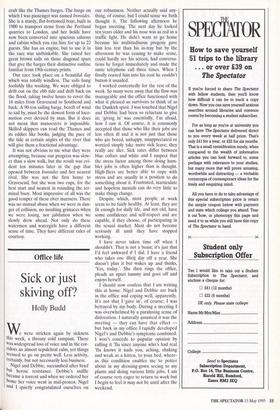Office life
Sick or just skiving off?
Holly Budd
We were stricken again by sickness this week, a throaty cold rampant. There was widespread loss of voice and in the cor- ridors an almost sepulchral calm, yet things seemed to go on pretty well. Less activity, certainly, but not necessarily less business. Nigel and Debbie, succumbed after brief but heroic resistance. Debbie's sniffle became a torrent and when we ordered her home her voice went in mid-protest. Nigel and I quietly congratulated ourselves on our robustness. Neither actually said any- thing, of course, but I could sense we both thought it. The following afternoon he began sneezing. The next day he looked ten years older and his nose was as red as a traffic light. He didn't want to go home because his multitudinous progeny gave him less rest than his in-tray but by the afternoon he was ceasing to make sense, could hardly see his screen, had conversa- tions he forgot immediately and made the same telephone call three times. When I finally coaxed him into his coat he couldn't button it unaided.
I worked contentedly for the rest of the week. So many were away that the flow was manageable and the office functioned with what it pleased us survivors to think of as the Dunkirk spirit. I was touched that Nigel and Debbie had been so reluctant to give in; 'giving in' was essentially, I'm afraid, how I saw it. Of course, it is commonly accepted that those who like their jobs are less often ill and it is not just that those who are bored, unhappy, unappreciated or worried simply take more sick leave; they really are iller. Sick rates differ between blue collars and white and I suspect that the stress factor among those doing hum- bler jobs is often higher than is thought. High-fliers are better able to cope with stress and are usually in a position to do something about it. Frustrated, inarticulate and hopeless menials can do very little to make things change.
Despite which, most people at work seem to be fairly healthy. At least, they are fit enough for daily life, and not old, have some confidence and self-respect and are capable, if they choose, of participating in the sexual market. Most do not become seriously ill until they have stopped working.
I have never taken time off when I shouldn't. That is not a boast; it's just that I'd feel awkward if I did. I have a friend who takes one illicit day off a year. She doesn't plan it but wakes up and thinks, `Yes, today.'. She then rings the office, pleads an upset tummy and goes off and enjoys herself.
I should now confess that I am writing this at home. Nigel and Debbie are back in the office and coping well, apparently. It's not that I 'gave in', of course; I was betrayed by my body. During a meeting I was overwhelmed by a paralysing sense of dislocation. I naturally assumed it was the meeting — they can have that effect but back in my office I rapidly developed Nigel's and Debbie's symptoms combined. I won't concede to popular opinion by calling it 'flu since anyone who's had real 'flu knows it nails you, aching, shaking and weak as a kitten, to your bed, where- as this condition enables me to potter about in my dressing-gown seeing to my plants and doing various little jobs. I am of course very eager to return to work but I begin to feel it may not be until after the weekend.


































































 Previous page
Previous page